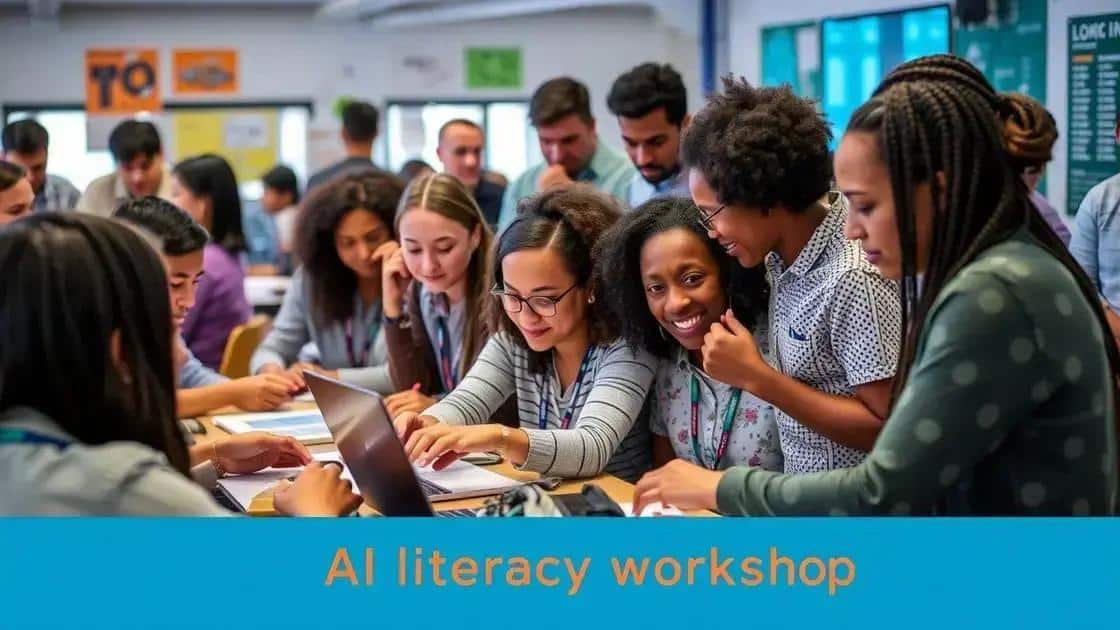AI literacy campaigns trends: what to expect in 2024

AI literacy campaigns focus on educating diverse audiences about artificial intelligence, emphasizing inclusivity, practical skills, and ethical considerations to prepare individuals for a technology-driven future.
AI literacy campaigns trends are becoming crucial as technology evolves. Ever thought about how these initiatives will shape learning environments and job markets? Let’s dive into what’s changing and why it matters.
Understanding AI literacy and its importance
Understanding AI literacy is essential in today’s digital age. As artificial intelligence continues to evolve, knowing how to engage with it becomes vital for all individuals.
To comprehend the significance of AI literacy, we should acknowledge its impact on various fields. Becoming familiar with AI tools can enhance productivity and inform decision-making processes in numerous sectors.
The Importance of AI Literacy
AI literacy involves more than just understanding artificial intelligence; it requires recognizing its application and implications in daily life. By fostering a broad knowledge of AI, we prepare ourselves for future innovations.
- Increases employability in tech-driven industries.
- Enhances critical thinking in evaluating AI applications.
- Promotes informed citizenship as technology evolves.
Moreover, developing AI literacy helps in demystifying the technology and encourages collaboration among diverse groups. This collaborative spirit can lead to innovative solutions that address societal challenges.
Navigating the AI Landscape
As we navigate this new terrain, it’s important to remember that everyone can learn to understand AI. Whether in schools, workplaces, or at home, accessible resources must be available to support continuous learning.
- Workshops and interactive sessions can engage different audiences.
- Online courses are a convenient way to learn at one’s own pace.
- Community discussions can foster peer-to-peer learning.
In essence, understanding AI literacy prepares us to face a future where AI is integrated into every aspect of our lives. It’s not just about technology; it’s about how we can use technology ethically and responsibly.
Current trends in AI literacy campaigns

Current trends in AI literacy campaigns show a rapid evolution in how we engage with technology. With more organizations recognizing the need for digital education, the landscape is changing quickly.
These campaigns aim to equip individuals with the necessary skills to navigate the complexities of artificial intelligence. By focusing on accessibility and engagement, they strive to make learning both effective and enjoyable.
Focus on Inclusivity
One of the key trends is a focus on inclusivity. Many campaigns are now tailored to reach diverse audiences, ensuring that everyone has access to AI education. This means breaking down barriers that have historically limited participation.
- Programs for underserved communities are growing.
- Materials are being developed in multiple languages.
- Workshops are being offered in various formats to accommodate different learning styles.
An inclusivity-driven approach encourages a variety of perspectives to shape the future of technology. This diversity enhances innovation and creativity within the field.
Emphasis on Practical Skills
Another notable trend is the increasing emphasis on practical skills. Many campaigns now prioritize hands-on learning. This type of education allows participants to apply their knowledge in real-world scenarios.
- Boot camps and workshops provide active learning experiences.
- Projects encourage teamwork and collaboration.
- Case studies help learners understand real-world applications.
These practical experiences are essential for building confidence and competence in using AI tools. By focusing on the application rather than just theory, we prepare learners for the demands of the job market.
Additionally, partnerships between educational institutions and tech companies are becoming more common. These collaborations create a pathway for individuals to transition from learning to employment. As a result, students can gain valuable insights from industry experts while also building essential networks.
Overall, the current trends in AI literacy campaigns highlight a commitment to creating a more informed and capable society. By fostering inclusivity and practicality, we can empower individuals to thrive in an increasingly AI-driven world.
Effective strategies for engaging diverse audiences
Effective strategies for engaging diverse audiences are essential in promoting AI literacy. The diversity of learners brings a wide range of perspectives and backgrounds. Understanding their unique needs is key to successful educational initiatives.
One strategy involves using culturally relevant materials that resonate with different audiences. By incorporating examples and case studies from various cultures, educators can create a more inclusive learning environment.
Utilizing Technology
Technology plays a critical role in reaching diverse groups. Online platforms can provide learners with access to resources anytime and anywhere. These platforms often feature interactive content that engages users effectively.
- Use mobile-friendly resources to reach learners on various devices.
- Offer webinars and virtual workshops for broader access.
- Include gamification elements to make learning fun and engaging.
In addition, social media can expand outreach efforts. Engaging content shared on social platforms can attract different demographics and stimulate discussions around AI literacy.
Fostering Collaborative Learning
Another effective strategy is fostering collaborative learning experiences. Group projects encourage teamwork and creativity, allowing individuals to share their knowledge and skills.
- Create diverse teams to enhance problem-solving.
- Implement peer mentorship programs pairing experienced individuals with those new to AI.
- Host community events that invite public participation.
The dynamics of group learning can empower participants, giving them a sense of belonging and promoting deeper engagement with the material. By valuing each person’s contribution, a rich learning atmosphere can develop.
Overall, when strategizing to engage diverse audiences in AI literacy, it’s crucial to be adaptable. This ongoing effort helps build a more knowledgeable and skilled community. Understanding and addressing the needs of diverse learners will ensure that efforts in AI literacy are both effective and far-reaching.
The future of AI literacy and its implications

The future of AI literacy is bright and filled with possibilities. As technology advances, it becomes crucial to equip individuals with the knowledge and skills necessary to adapt and thrive in an AI-driven world.
We can expect AI literacy to become part of mainstream education. Schools and universities will likely integrate AI concepts into their curriculums, ensuring that all students acquire a foundational understanding. This preparation will not only enhance job readiness but also empower young minds to innovate.
Integration of AI in Learning
Moreover, the integration of AI tools in learning environments will enhance educational experiences. Using AI-powered applications can offer personalized learning paths, helping students grasp challenging concepts at their own pace.
- Adaptive learning systems track student progress.
- Interactive simulations provide hands-on experiences.
- AI-driven analytics help teachers tailor their approaches.
This tailored method can significantly boost engagement and retention, making learning more effective for diverse learners. It also prepares students to work alongside AI technologies in future careers.
Ethical Considerations
As we embrace AI literacy, ethical considerations will become increasingly important. Understanding the implications of technology ensures that individuals can make informed decisions about its use.
- Discussions around data privacy will be essential.
- Teaching critical thinking skills will help evaluate AI outcomes.
- Encouraging responsible AI usage will promote a safer environment.
By addressing these ethical aspects, we can cultivate a generation of responsible users and developers of AI technologies.
Finally, collaboration between industries, educational institutions, and governments will pave the way for comprehensive AI literacy. By uniting efforts, we can create inclusive programs that nurture talent from all backgrounds, fostering innovation and progress.
In conclusion, the future of AI literacy holds great promise for individuals and society. By integrating AI concepts into education and promoting ethical understanding, we can prepare for a world where AI is part of everyday life. Emphasizing inclusivity and hands-on learning experiences will help empower diverse learners. Collaboration among educational institutions, industries, and governments is vital to ensure everyone benefits from the advancements in AI technology. Together, we can foster a knowledgeable and responsible community ready to embrace the challenges and opportunities of the digital age.
\n\n\n
\n
\n
FAQ – Frequently Asked Questions about AI Literacy
Why is AI literacy important for students?
AI literacy helps students understand how AI affects their lives and prepares them for future careers where AI will be common.
How can schools incorporate AI literacy into their curriculums?
Schools can integrate AI concepts through dedicated courses, workshops, and hands-on projects that leverage AI tools.
What role do ethics play in AI literacy?
Ethics is crucial in AI literacy as it teaches students about responsible AI use, data privacy, and the implications of technology.
How can communities promote AI literacy among diverse groups?
Communities can hold inclusive events, provide resources in multiple languages, and engage various stakeholders to encourage participation.





